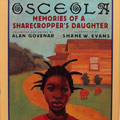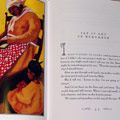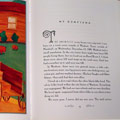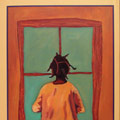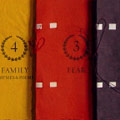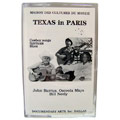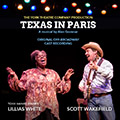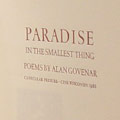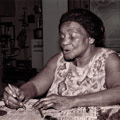Osceola: Memories of a Sharecropper's Daughter
by Osceola Mays, Alan Govenar, Shane Evans (Illustrator)
About
Publisher: New York: Hyperion Books for Children, 2000
Details: 64 pages, Hardcover
Format: 0.46 x 9.38 x 7.39 in.
Reviews
From Booklist
This slim volume contains the powerful transcribed oral history of an African American woman now in her nineties. Born in East Texas in 1909, Osceola Mays grew up under slavery's oppressive legacy: "We lived apart, separated from white folks in just about everything we did." Her grandmother had been a slave; her father was a sharecropper. Govenar offers Mays' story in her own words, culled from years of taped conversations, distilling moments from her early life history in brief, potent chapters: "How I Got My Name," "Learning about White Folks," "Juneteenth," "Freedom," "Fear," and finally "Growing Up and Moving On." The detailed horrors of slavery and segregation are made more devastating by Mays' conversational, matter-of-fact voice. Shane W. Evan's strong paintings of Mays and her daily life suggest both folk art and subversive modern art with their flat, broad strokes and slightly skewed perspectives. This is a valuable, deeply affecting addition to the history of this period, and it will give young readers insight into the roots of contemporary racism.
Gillian Engberg
From Kirkus Reviews
Govenar has collected anecdotes, reminiscences, stories, and snatches of songs and poems from 15 years of conversations with 90-year-old Osceola Mays about her youth. In short chapters Mays tells about her home, family, name, baptism, fearful relations with whites, school, celebrations and holidays, the death of her mother, and her new stepfamily. The language is simple, spare, and eloquent as she plainly relates the joys and sorrows of growing up African-American in the rural south in the early part of this century. Govenar includes an introduction, and his editing is invisible: reading this book with a child is like having a wise old grandmother tell stories, with the added benefit of glowing illustrations. A fine introduction to a particular time and place, as well as to the value of oral histories. (Biography. 8-12)
Copyright ©2000, Kirkus Associates, LP. All rights reserved.
From Horn Book
Born in 1909 in Waskom, Texas, a small community of 250 people and 135 rural mail stops, Osceola Mays has many stories to tell. Her grandmother was a slave, her father a sharecropper, and during her life Osceola has survived a hardscrabble existence marked by separation, death, prejudice, faith, injustice, hope, and triumph. Alan Govenar has shaped her recollections into an accessible and highly personal account of a full life. Osceola remembers specific childhood incidents, such as "The Day I Was Baptized." She describes the pond, the snakes bobbing their heads out of the water, her new red dress, and her childlike joy: "Mama told me I was going to be an angel someday if I got baptized, and I wanted to be an angel." She also recalls more general impressions of a darker side of her childhood, a time when her father never had any real money but instead bartered with a currency called "brozine" that he could "use in a little store that the boss man owned." She reminisces about her fear of white folks, particularly the mail carrier who once scolded her when she ran to get letters before he had delivered them: "Get back to the house! Don't ever come here again when I'm putting mail in the box." This particular incident leads her to speculate about greater prejudice, always in the voice of the child observer shaped by these events. "If anyone around Waskom got out of the rules and regulations of the white people, the mob would come and get them. They had to run to another state to get away." Tempering these generalities with fonder family memories, such as annual Juneteenth celebrations and Santa Claus Night, Osceola rounds out an oral history as rich in voice as it is in content. She also pays homage to the oral tradition, through both her own stories and those passed down by her mother and grandmother, naturally presenting stories, and sometimes poems and songs, within a story. Shane Evans's illustrations-formally composed paintings that gently evoke character of both people and place-provide context by depicting a person or setting central in each of the twenty short chapters. The book's strong oral quality will make it a fine read aloud.
Copyright © 2000 The Horn Book, Inc. All rights reserved.
From Black Issues Book Review Jan-Feb 2000
Govenar captures Osceola's voice and cadence without romanticizing the harsh realities of segregation and discrimination.
Awards
2000
First Prize, Boston Globe – Horn Book Honor Award
First Place, Nonfiction Picture Book, New York Book Show
Second Place Nonfiction Picture Book Jacket, New York Book Show
2001
Orbis Pictus Honor Book for Outstanding Nonfiction for Children
National Council of Teachers of English)
ALA (American Library Association) Notable Children’s Book
This is Available for Purchase
Video
A sample clip from this short biographical film by Alan Govenar.
